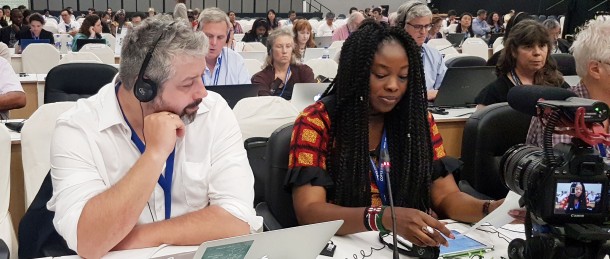Mariann Bassey Orovwuje of the Environmental Rights Action/Friends of the Earth Nigeria (ERA/FoEN) and member of the Friends of the Earth International (FoEI) delegation at the 13th Meeting of the Conference of the Parties (COP13) to the UN Convention on Biological Diversity (CBD) in Cancun, Mexico, presented a statement on behalf of the Civil Society Working Group on Synthetic Biology during a plenary session, asking for more regulation on synthetic biology.

Mariann warned: “Gene drives have quickly emerged as an extremely high risk synthetic biology application since the last COP and should therefore be placed under a moratorium.”
This was part of a request from 168 organisations worldwide, including the FoEI, who signed a “Common call for a global moratorium on gene drives”. The signatories want the moratorium to be effective on any further technical development and experimental application of gene drives and on their environmental release.
Gene drives can detrimentally alter ecosystems and boost agrochemical sales
Gene drives are a form of experimental genetic engineering technology which is raising a lot of concern within civil society. It consists of passing on a specific bioengineered trait to all or most of the offspring of a species so the trait becomes dominant in wild populations of the target species over a few generations. This technology can be used to eradicate invasive animal species for conservative purposes, weed species for agricultural purposes or insects like the mosquitoes that transmit malaria for health security purposes.
The problem is that, given the current state of scientific knowledge, it is not possible to predict the ecological impacts of the environmental release of gene drives. Eradicating a single species or modify its behavior can alter ecosystems. Suppressing a weed species can lead, for example, to the loss of habitat for animal species and the establishment of invasive ones.
Gene drives are developed using a gene editing system called CRISPR-Cas9. In agriculture, its development can boost agrochemical sales because there have been proposals to render weed species susceptible to proprietary agrochemicals (just like Monsanto rendered its GMOs resistant to Roundup).
Synthetic Biology needs an operational definition
Mariann Bassey called on the Parties to “adopt an operational definition of synthetic biology”, as the absence of a definition has already begun to obstruct work on this topic under the CBD and its Protocols (the Protocol of Nagoya and the Protocol of Cartagena) and has been used as an argument against examining the risk assessment of synthetic biology.
According to the Civil Society Working Group on Synthetic Biology – in which are also participating EcoNexus, Ecoropa, ETC Group, Heinrich Böll Foundation, The Sustainability Council and Third World Network – synthetic biology is “the next generation of biotechnologies that attempt to engineer, redesign, re-edit and synthesise biological systems, including at the genetic level”. The definition that the CBD and the Protocols should adopt “should include techniques for genome editing and genome synthesis”, stated the Group in its document “Synthetic Biology and the CBD”.
Digital sequencing can lead to digital biopiracy if not regulated
The Nigerian activist pointed out the need to address the “urgent issue” of digital sequences and biopiracy at the CBD level and the Nagoya Protocol level. “Rapid advances in sequencing and synthesising DNA mean that digital biopiracy is now possible, circumventing the rules on access and benefit sharing (ABS)” set up by the Nagoya Protocol, warned the Civil Society Working Group on Synthetic Biology in its document titled: “Synthetic Biology and the CBD”.
By ABS, the Nagoya Protocol means the sharing of the benefits arising from the utilisation of genetic resources and states that it must be done in a fair and equitable way.
The risk with genetic resources (DNA sequencing, for example), is that they can be transferred digitally and synthesised into living matter without physical exchange of biological material, “which poses major challenges to the many ABS systems that assume and utilise material transfer agreements,” wrote the Group. “It is important for the CBD to take a leading role in determining how to ensure that digital sequence information and gene editing are not used to amplify biopiracy and undermine ABS regimes.”
A need to address the Socio-Economic and Ecological impacts of Synthetic Biology
“The Convention requires an ongoing process to address the impacts of synthetic biology on sustainable use of biodiversity – especially the socioeconomic and indirect impacts”, said Mariann Bassey during the plenary. For example, some natural products are being produced with synthetic biology techniques by the synthetic biology industry instead of by farmers, and more synthetic biology products are in development – there is a huge risk that farmers lose their livelihoods.
Mariann Bassey also called on the Parties to address the issue of synthetic biology under the focus of biosafety, at the level of the Cartagena Protocol, where she said they should establish a process for the development of guidance on the basis of the outline on “Risk Assessment under the Cartagena Protocol” developed by the AHTEG. It is urgent given that synthetic biology is likely to lead to the development of organisms that will differ fundamentally from naturally occurring ones.
